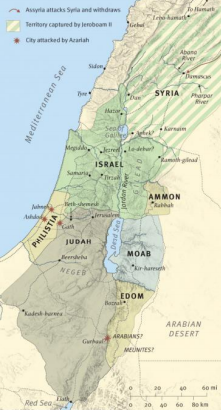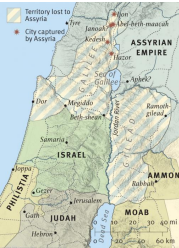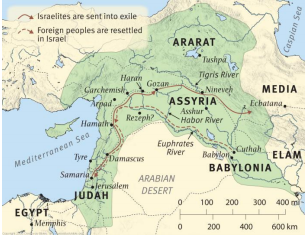Books covered under Kings and prophets of both northern (Israel) kingdom and Southern (Judah) Kingdom.
KINGS: Both Israel and Judah: 1 Kings 12-22, 2 Kings, and 2 Chronicles 10- 36
PROPHETS: Canonical Prophets and Non-Canonical prophets.
What is canon?
The word canon is used to describe those books recognized as inspired of God. The word comes from the Greek “kanwn” and most likely from the Hebrew “qaneh” and Akkadian, “qanu”. Literally, it means
(a) a straight rod or bar;
(b) a measuring rule as a ruler used by masons and carpenters; then
(c) a rule or standard for testing straightness.
Canonical Prophets are the ones who wrote their prophecy and those are included in the Bible.
Non-Canonical prophets are the ones whose prophecies were never written down either by themselves or by others as a separate prophetical book.
Prophets to Israel:
Canonical:
1. Hosea,
2. Amos, and
3. Micah (prophet for both Israel and Judah),
Non Canonical: But they are found written with the Kings’ history. They are such as Elijah, Elisha and others in Israel.
Prophets to Judah:
Canonical:
1. Isaiah, Micah (N & S),
2. Jeremiah,
3. Joel,
4. Habakkuk, and
5. Zephaniah.
Non Canonical:
Other Prophets during Divided Kingdom:
1. Jonah (prophet to Assyrian city of Nineveh),
2. Nahum (Concerning Nineveh)
3. Obediah (Concerning Edom)
Prophets during exile:
1. Jeremiah (in Jerusalem during exile)
2. Daniel (1 & 2 batch exilic group in Babylon)
3. Ezekiel (2 & 3 batch exilic group in Babylon)
Other history book involved along with book of Jeremiah, Daniel and Ezekiel during this period is ESTHER.
Prophet during post exile (Return to Jerusalem):
1. Haggai (during rebuilding of Temple)
2. Zechariah (contemporary to Haggai during rebuilding of Temple)
3. Malachi (Towards the end of OT’s post-exilic period)
Other historical books involved other than the books of Haggai, Zechariah and Malachi are Ezra and Nehemiah
Previously seen…..
2 Kings 14:23-29:
Jeroboam II (782-753 BC), the 13th king of Israel. He is the 4th King of 5th dynasty (of Jehu)
Jeroboam II, who ruled Israel for 40 years, was a capable ruler but a poor religious reformer due to his immorality and idolatry.
V. 24…sons of Jeroboam the son of Nebat, who had made Israel sin … Another repetition to show the sinfulness of the 13th KOI.

V. 25… restored the territory of Israel… Jeroboam II was a powerful king who had recovered the lost land to Syria. Syria became weak due to Assyrian invasion.
The Assyrian assault on the area north of Israel (alluded to in 13:5) seriously weakened the kingdoms of that region, including Syria, and this allowed Jehoash to recapture some Israelite towns from the Syrians (13:25). In the immediately subsequent years, the Assyrian kings only infrequently ventured out on military campaigns to their west, and in this context Jeroboam II of Israel was able to further the Israelite recovery begun by his father, extending the borders of Israel from the Sea of the Arabah in the south (the Dead Sea, Josh. 3:16; 12:3) to the northern Lebo-hamath… Jeroboam was thus able to restore the territory of northern Israel to Solomonic proportions (1 Kings 8:65)… – ESV Study Bible.
V. 25… servant Jonah the son of Amittai… Jonah was the prophet along with Hosea (1:1) and Amos (1:1). Also Micah was prophesying for both Israel and Judah (Micah 1:1). Mid 8th century BC was prosperous year for both Israel and Judah, but the spiritually it was the lowest time for both nations. So God raised prophets like Hosea, Amos and Hosea in Israel. Eventhough Micah was from Judah, he had prophecies for both nations (1:1).
V. 26 & 27:… saved them by the hand of Jeroboam… God was gracious and, was slow to bring judgement on the people of Israel.
V. 28… recaptured for Israel from Damascus and Hamath what had belong to Judah… Jeroboam II understood to have had control over Judah.
—————————————————————————————————————–
The Last 6 Kings of Israel after Jeroboam II. (2 Kings 15, 17, & 18)
THE LAST DAYS OF ISRAEL…. After a glorious reign of Jeroboam II, the Northern Kingdom of Israel started
falling drastically marking the end of the dynasty of Jehu leading to the beginning of the end of Israel.
Zechariah’ (748): the 14th king of Israel. He is the 5th King of 5th dynasty (of Jehu).
– Ruled for six months (2 Kings 15:8-12).
– Bad king.
– Killed by Shallum,
– Jehu dynasty came to an end after ruling more than a century. The end was announced by God to King Jehu (2 Kings 15:12 refer 2 Kings 10:30).
Shallum (748): the 15th king of Israel, the lone king in the 6th dynasty.
– Ruled for 1 month and was killed by Menahem, his successor (2 Kings 15: 13 & 16)
Menahem (748-738): the 16th king of Israel, first king of 7th dynasty. (2 Kings 15: 17 – 22)
– Ruled for 10 years,
– By thing time Assyrian grew stronger into an empire. Assyrian King Tiglath-Pileser III dominated Menahem’s reign by imposing burdensome tributes which force Menahem to increase Israel’s taxes in an oppresivemanner.
Pekahiah (738-736): 17th King of Israel, 2nd king of 7th dynasty. ( 2 Kings 15:23-26)
– Ruled for 2 years.
– Was killed by his own officer.

Pekah (748-730): 18th King of Israel, lone king of 8th dynasty. (2 Kings 15:27-31, 16:5)
– Ruled for 20 years,
– Assyrian annexed certain of Israel’s territories and took man of its people captive, which is the beginning of the end of Israel. Assyrian Emperor Tiglath Pileser’s imperial was to occupy the land to populate with their people and deporting significant percentage of Israelites population to spread all over their territory.
– Went against Judah along with Assyrian king for a losing war (16:5)

Hoshea (730-721): 19th last King of Israel, the lone king in the 9th dynasty. (2 Kings 17:1- 4)
– Ruled for 9 years,
– Hoshea reestablished his vassal (gave loyalty to a feudal lord by paying tribute) with Shalmaneser V (727-722), the successor Tiglath-Pileser. Later he defaulted his vassal and tried to align with Egypt by courting Egypt which brought the wrath of Assyrian king upon him.
THE FALL OF ISRAEL (2 Kings 17): The Northern Kingdom has a brief history of little over 200 years. The authors now describe the uprooting and scattering of Israel, long foretold (1 Kings 14:15) but delayed because of God’s promises and God’s character.
When the measure of sin is filled up, the Lord will forbear no longer. The inhabitants of Samaria must have endured great affliction. Some of the poor Israelites were left in the land. Those who were carried captives to a great distance, were mostly lost among the nations. – Matthew Henry Concise Commentary.